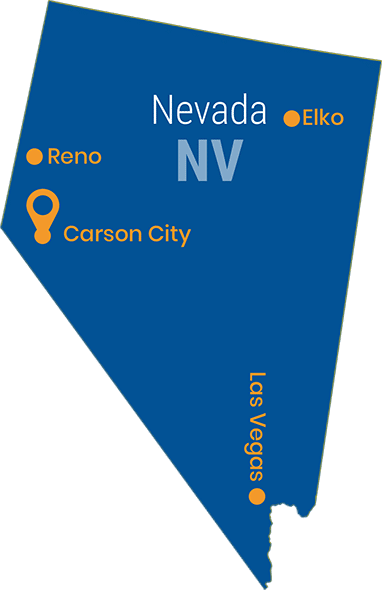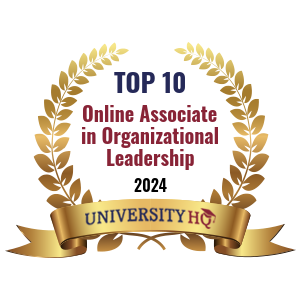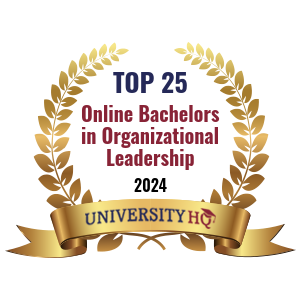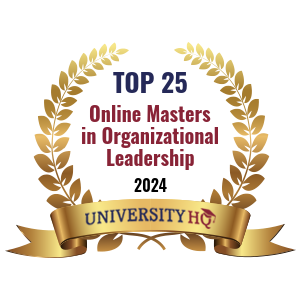What is Organizational Leadership?
A sub-field of business, organizational leadership is a great major area of study for individuals interested in helping companies and organizations function more efficiently. Graduates often possess a wide variety of knowledge and skills that can be applied in many different settings and across numerous industries. This results in highly versatile professionals capable of qualifying for some of the highest-paying management occupations available.
There are many different opportunities available for organizational leadership professionals in Nevada, with companies and organizations in many industries eager to hire workers with expertise in this field. Employers set their own standards and expectations, however, which means that responsibilities often differ between jobs, as well.
In most cases, organizational leaders use their knowledge and skills to help businesses operate better. This can be done in many ways, from ensuring established goals are met to assessing how a decision will impact overall staff morale. These professionals may also be tasked with finding ways to improve productivity and/or efficiency. Other common responsibilities include supervising other works, promoting productive workspaces, and verifying that duties are completed correctly. Another important component of this profession is often making sure that staff members feel supported by their employers.
The most important skills for professionals in this field must possess are communication, problem-solving, strategy, creative thinking, and management. Organizational leaders also tend to benefit from extensive knowledge in business.

Featured Online Programs
Online Organizational Leadership Education in Nevada
According to the US Bureau of Labor Statistics (BLS), employment for management occupations is projected to grow 8% from 2021 to 2031. This is faster than the average for all professions and will result in an increase of about 883,900 new jobs over the decade. Including the replacement of workers who retire or change career fields, approximately 1.1 million management openings are expected each year.
It's important to realize that organizational leadership degree graduates may also qualify to apply for employment in other business and finance professions. Growth for these occupations is comparable, with an expected 7% increase from 2021 to 2031. This will result in an additional 980,200 applicable job openings each year.
Employment prospects vary by occupation, however, with some professions projected to perform much better than others. While the anticipated growth for industrial production managers is only 2%, job availability for computer and information systems managers is expected to increase by 16%. Medical and health services managers are projected to do even better, with an anticipated growth rate of 28% over the next decade. This is much faster than average for all occupations.
Professional and business services is the third largest industry in Nevada, accounting for $19 billion in revenue each year. Opportunities are also possible in entertainment, real estate, retail, education services, healthcare, finance, construction, manufacturing, transportation, and wholesale. With companies and organizations in most sectors seeking to hire organizational leadership professionals, graduates can feel relatively confident in their ability to find work within the state.
Based on data provided by the BLS, 109,840 management professionals were employed in Nevada as of May 2022. The annual mean wage for these jobs was $110,190, which is significantly above the state’s annual mean wage of $55,490 for all occupations in the state. Nevada also employed 63,300 business and financial operations professionals with an annual mean wage of $78,900.
Many colleges and universities offer an organizational leadership degree program in Nevada. Some prospective organizational leadership students may be tempted to enroll at institutions in other states, however. This has become particularly easy as online programs become more readily available throughout the nation; you might live in one state and take an operations management, human resources, business administration, or organizational leadership degree online from across the country. Despite the convenience of distance learning options, individuals who expect to seek employment in Nevada may want to give preference to local schools. This typically results in a more geographically relevant education and ensures graduates possess the knowledge and skills, such as critical thinking and leadership skills, sought most by companies and organizations in the region.
While it’s possible to find entry-level jobs with limited academic experience, most employers in Nevada and the rest of the United States expect organizational leadership professionals to possess some amount of higher education. This is particularly true for larger companies.
Prospective students should have little trouble finding an applicable degree program, with most colleges and universities offering relevant degrees at the associate, bachelor’s, master’s, and doctoral levels. Bachelor’s degrees are, however, generally considered the field standard for most management, business, finance, and other leadership positions. Notably, individuals planning to pursue roles with supervisory components will typically require graduate degrees.
Online Associates (AS)

Associate degrees in organizational leadership generally consist of 60 credit hours of coursework that take full-time students approximately two years to complete. Curriculums vary, but most undergraduate programs are comprised of both general liberal arts and major-specific classes. As a result, students can expect to study various topics in communication, mathematics, and science, in addition to subjects relevant to their chosen field. This provides a well-rounded education with a strong foundation for future learning, as well as a broad introduction to organizational leadership and business. Some of the most common areas of study include human resource management, employment law, organizational development, and business communications.
While this type of degree program can lead to entry-level employment as account managers, community relations managers, training directors, diversity specialists, and executive assistant positions, opportunities for graduates may be limited. This is because most companies and organizations prefer to hire professionals with more education and/or experience. Associate degrees do, however, tend to cost much less than other options, making them ideal for individuals seeking to enter the job market fast.
Many people use associate degrees as an entry point into the field. Graduates typically have the knowledge and skills needed to thrive in future academic settings, making them ideal candidates for bachelor’s degree programs. It’s also often relatively simple to transfer prior undergraduate credit to other colleges and universities.
Online Bachelors (BS)

Bachelor’s in organizational leadership degrees generally consist of 120 credit hours of coursework that take full-time students approximately four years to complete. As undergraduate programs, curriculums are often still comprised of general liberal arts and major-specific classes. In addition to studying various topics in communication, mathematics, and science, students can expect a broad introduction to the most important subjects in organizational leadership. Some of the most common areas of study at this level include organizational development, organizational behavior, strategic planning, communication strategies for leaders, assessment in organizations, social conflict, leadership skills, and negotiation.
Many colleges and universities encourage organizational leadership majors to select concentrations, or specialty areas of study. Choosing to pursue additional instruction in a particular sub-field can help prepare students for certain types of employment after graduation.
Concentration options vary, but often include:
- Human Resource Management
- Finance
- Project Management
- Marketing
- Operations Management and Supervision
- International Business
Additionally, those enrolled should anticipate completing capstone projects and/or participating in internships with nearby businesses and organizations.
According to the US Bureau of Labor Statistics, bachelor’s degrees are typically the minimum education requirement for management, business, and financial occupations; this includes a traditional or online organizational leadership degree. Graduates will have many employment opportunities, but the majority seeks jobs as training and development managers, management analysts, sales managers, human resource managers, and industrial production managers.
Alternatively, many graduates choose to continue their education by enrolling in graduate school. This not can lead to increased job prospects, but also higher pay potential. Those interested in earning a master’s degree in organizational leadership should be prepared to meet minimum grade point average (GPA) and Graduate Record Examinations (GRE) score requirements set by their chosen institution.
Find Your Online Organizational Leadership Program
Online Masters (MS)

Master’s degrees in organizational leadership generally range from 30 to 36 credit hours of coursework that take full-time students approximately two to three years to complete. Graduate programs no longer incorporate general liberal arts classes, although students may be required to have completed certain undergraduate prerequisite courses prior to enrollment. This ensures all incoming students possess the basic knowledge in critical thinking, conflict management, and interpersonal skills needed for advanced study in the field. You may also choose to earn a Master of Business Administration (MBA), which can provide the same outcome as an organizational leadership master's degree.
Many graduate programs also allow students to select concentrations to prepare for specialized employment in the field.
In order to prepare students for advanced employment opportunities in the field, curriculums often provide instruction in leadership theory, organizational behavior, human resources management, strategic planning, critical thinking, leadership skills, and marketing is common. Other common areas of study include organizational sustainability, digital media and marketing, and diversity and conflict management in the workplace.
Many colleges and universities also expect organizational leadership majors at this level to complete capstone projects and/or participate in internships, making them fully prepared for management positions. Additionally, those enrolled are likely to have opportunities to select concentrations.
While options vary by institution, specialization is often available in the following areas:
- Global Business
- Human Resources Management
- Healthcare Management
- Nonprofit Management
- Leadership Coaching
- Social Entrepreneurship
Organizational leadership graduates often qualify for employment as business executives, management consultants, school principals, human resources managers, training and development managers, and administrative services managers. Positions are typically available in both the public and private sectors. Individuals who possess master’s degrees also tend to be highly sought-after by companies and organization, making it possible to find work in most industries.
Online Doctorate (PhD)
A PhD or doctorate in organizational leadership generally consists of between 60 and 120 credit hours that take full-time students four to seven years to complete. These are terminal degrees that require students to meet high academic standards. Curriculum can vary significantly from institution to institution, but commonly include classes in organizational design, education law, finance, strategic management of non-profit organizations, collaborative leadership and partnership, and leadership theory and practice.
In addition to traditional classroom instruction, those enrolled are likely to participate in extended periods of independent study and research. This work typically culminates in the defense of a written dissertation before a board of professors. Graduates often qualify for employment as training and development managers, postsecondary educators, top executives, organizational development consultants, and organizational developmental directors.
Become a Leadership Professional in Nevada
Earning a degree in organizational leadership can lead to a wide variety of different employment opportunities in Nevada and beyond. With so many options available, it’s important to spend some time identifying your unique career goals. Once you determine your preferred occupation, it becomes easier to plan your next steps. Every profession has unique standards and expectations. Researching and becoming familiar with these will also ensure you select a relevant degree level and organizational leadership program type, as well as a departmental concentration, minor area(s) of study, elective courses, internship opportunities, and/or extracurricular activities.
In addition to earning an appropriate degree, there are other ways to prepare for success in your chosen occupation. Obtaining one or more relevant certifications can help you stand out among job candidates during the hiring process. Not only do extra credentials indicate your commitment to the field, but they also showcase any special knowledge and leadership skills you have.
Find Online Organizational Leadership Programs
Additional credentials are not required for all positions, but are expected by some employers. In general, however, you are free to pursue the certifications most suitable to your profession. While there are many certifications to choose from, the Project Management Professional (PMP) credential is particularly popular among organizational leadership professionals. Overseen by the Project Management Institute (PMI), this certification demonstrates the ability to successfully manage projects of varying types and sizes. To obtain the PMP credential, project managers must meet various requirements and then pass a 180-question examination.
Another common way to improve your professional profile as an organizational leader is to join a professional organization or association. Members of these groups often enjoy many benefits including discounts for developmental opportunities, access to related academic journals, invitations to networking events, and much more.
There are several organizations and associations for organizational leadership professionals, but the most popular options include:
- Institute of Management Consultants (IMC)
- Society for Human Resource Management (SHRM)
- National Association of Sales Professionals (NASP)
Potential Careers for Organizational Leadership Graduates
- Administrative Services Manager
Administrative services managers coordinate office personnel and services in order to improve overall efficiency. In addition to overseeing various administrative office tasks, they often supervise staff members, schedule interviews, and maintain relevant records. They may also be expected to distribute mail, ensure office machines are maintained, conduct office supply inventories, and order new items as needed. According to PayScale, administrative services managers make an average base salary of $63,629 per year. - Chief Executive Officer (CEO)
CEOs oversee operations for entire companies and organizations, often making most business decisions. They also supervise the performance of other high-ranking individuals and formulate and enforce various strategic plans for staff. CEOs must be capable of providing good leadership, guidance, and management. According to PayScale, chief executive officers make an average base salary of $156,359 per year. - Community Organizer
Community organizers coordinate and manage group members in order to achieve various desirable outcomes. They tend to spend a lot of time creating and promoting targeted public awareness campaigns, as well as procuring resource access for employees and securing support from leadership. They may also be expected to give dynamic presentations on pertinent topics, as well as recruiting, screening, and training new team members. According to PayScale, community organizers make an average base salary of $54,328 per year. - Healthcare Administrator
Healthcare administrators oversee the performance of nurses and nursing assistants working in hospitals, nursing homes, correctional facilities, and primary-care medical practices. In addition to coordinating staff training and conducting performance reviews for subordinates, they also ensure their assigned areas adhere to all required accreditation requirements. According to PayScale, healthcare administrators make an average base salary of $74,452 per year. - Information Systems (IS) Manager departments. Not only do they hire, conduct performance reviews, and fire non-management employees, but they also plan, direct, and coordinate most developmental opportunities. In some cases, they also implement and deploy new information, and/or administer technical solutions. According to PayScale, information systems managers make an average base salary of $87,257 per year.
- Financial Management Analyst
Management analysts are generally responsible for conducting organizational studies and evaluations. In addition to work simplification and measurement studies, they often design systems and procedures for workers, as well as teaching employees how to use them. In some cases, they prepare manuals to help increase efficiency and effectiveness in the future. According to PayScale, management analysts make an average base salary of $69,019 per year. - Public Relations (PR) Manager
PR managers use a variety of industry tactics to maintain and improve public perception of their company. Depending on the situation, they may boost awareness about products or services offered by their organization. Other common expectations include planning and executing promotional campaigns and programs, overseeing related social media platforms, training internal staff members, and verifying content accuracy with other departments. According to PayScale, public relations managers make an average base salary of $73,278 per year.
Search All Programs
